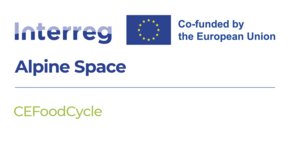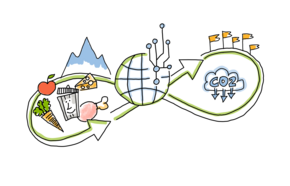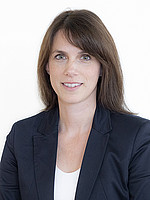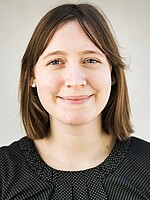
- Funding: Interreg Alpine Space
- Lead Partner Organisation: Salzburg University of Applied Sciences
- Project Lead: FH-Prof. Mag. Dr. Eva Lienbacher
- Team at Salzburg University of Applied Sciences: FH-Prof. Eva Lienbacher (Department Business and Tourism); FH-Prof. Werner Kaltner-Pomwenger, Reinhard Portenkirchner (Department Information Technologies and Digitalisation)
- Project Partner:
Austrian Institute of Ecology (Austria)
Paris Lodron University Salzburg (Austria)
E-institute, institute for comprehensive development solutions (Slovenija)
Nice Côte d’Azur Chamber of Commerce and Industry (France)
BSC, Business support organisation, ltd., Kranj (Slovenija)
Agency for Sustainable Mediterranean Cities and Territories (France)
LAMORO Development Agency (Italy)
DM Südtirol Alto Adige (Italy)
University of Applied Sciences Munich (Germany)
Cluster of Environmental Technologies Bavaria (Germany) - Project Duration: November 2022 to December 2025
- Project Website: CEFoodCycle - Alpine Space Programme (alpine-space.eu)
Total eligible costs: 2.386.438 EUR
ERDF grants: 1.789.828 EUR
The vulnerability of Alpine areas calls to rethink the sustainability framework towards measurable actions. Food waste, for instance in the hospitality sector, occurs due to food overproduction, takeaway services or packaging. Little data and monitoring is at hand and no alpine-wide methodology available to measure resource savings along the food stream. Applying the concept of the Circular Economy (CE) to the food stream (production, use, disposal), the project creates a sustainable methodology to avoid food waste, re-use resources, and to close food cycles. For this, resource saving potentials for defined product categories such as fruit & vegetables, meat or dairy products are identified by consolidating Life-Cycle Assessment (LCA) standards. Based on data related to food production and consumption, connected CO2 emissions, Artificial Intelligence (AI) helps to design a digital service system that connects and enables stakeholders inside (e.g. farmers, food retailers, gastronomy) and outside the food stream (e.g. social associations, food banks, bioenergy generators) to identify optimisation potentials to transparently close food cycles and monitor food waste and CO2 emission reduction. Such a holistic perspective is the foundation skill and capacity development of stakeholders, enhancing sustainable, circular economic competitiveness. Closed food cycles require a cross-border approach as relevant stakeholders often operate transnationally.
Project outputs include 1) an alpine-wide consolidation of LCA methodology for defined food product categories, 2) an intelligent, digital LCA service system (IDLCASS) that helps users to evaluate decisions regarding resource / CO2 savings, 3) implementation of smart, closed circular food cycle networks, 4) regionally established Circular Food Hubs that acquire, educate and supervise stakeholders to make the impact of the AI system-supported decisions more sustainable, transparent and measurable.

Circular Food Hub
Der Circular Food Hub Salzburg - Bayern unterstützt regionale Unternehmen dabei, Potentiale gegen Lebensmittelverschwendung und für eine CO2-Reduktion zu identifizieren.
> mehr erfahren
Project staff at the department

Eva Lienbacher
Senior Lecturer
Department Business and Tourism
Room: Urstein - 213

Department Business and Tourism
Room: Urstein - 215